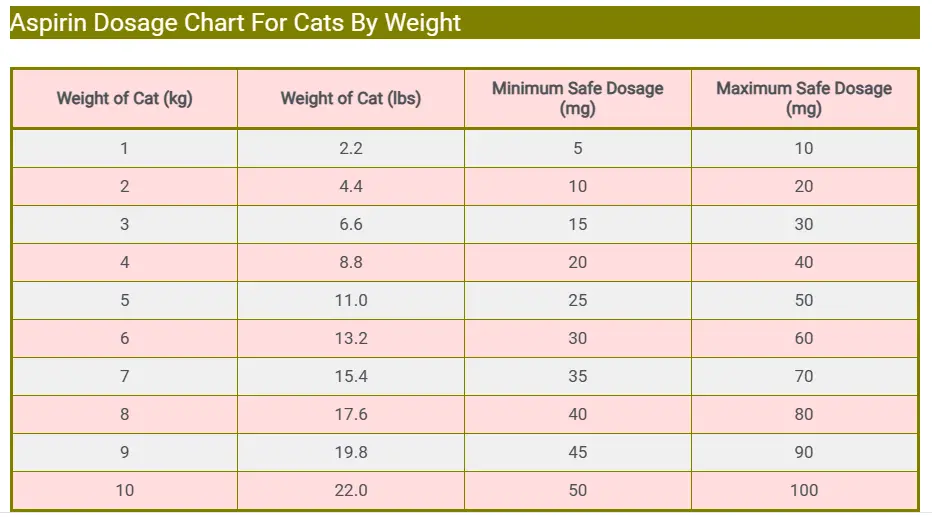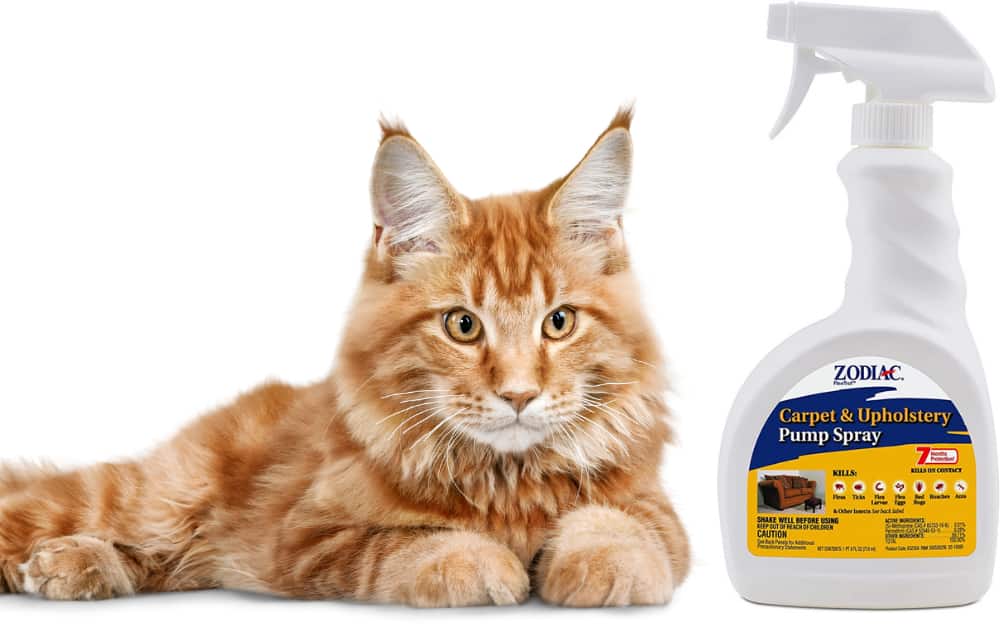The safe minimum dosage of aspirin for cats is 5mg/kg. However, for treating specific conditions, the dose can be increased to 10mg/kg. Cats can easily overdose on this medication, overdosing on aspirin can be toxic to felines, so make sure to administer the ideal dose with advice from a veterinarian only.
Aspirin Dosage For Cats

-
Ideal Dose: 5-10mg/kg (2-4 mg/lb)
-
Uses: Treating thromboembolic disease, Osteoarthritis, Musculoskeletal inflammation.
-
FDA Approved: No.
-
Variants: Tablets.
-
Storage & Handling: Room Temperature.
-
Administration: Vet Prescription.
Disclaimer: Self-medication can be hazardous. Please consult your veterinarian for personalized guidance on the appropriate dosage for your feline friend specific condition.
Caring for our beloved feline companions involves many responsibilities, including ensuring their health and well-being. However, when faced with a situation where our furry friends are in discomfort or pain, it’s natural to want to alleviate their suffering.
In such instances, aspirin might seem like a viable solution, but administering medication to cats requires careful consideration and expert guidance.
In this blog post, we delve into the topic of aspirin dosage for cats, exploring the safe practices pet owners should understand to protect their cats’ health.
Aspirin Dosage For Cats
Note: Aspirin is not commonly recommended for cats due to its potential toxicity. Cats lack certain enzymes in their liver that are necessary to metabolize aspirin safely, which can lead to severe complications, including gastrointestinal bleeding and kidney damage.
Aspirin dosage in cats is approximately 5-10mg/kg (2-4 mg/lb) of body weight, given with vet prescription only. However, this dosage can vary, and following your vet’s recommendations is important.
Also, consult your veterinarian before giving aspirin to your Kito, as it can cause adverse effects if not used correctly.
Aspirin Dosage Chart For Cats By Weight
| Weight of Cat (kg) | Weight of Cat (lbs) | Aspirin Minimum Safe Dosage (mg) | Aspirin Maximum Safe Dosage (mg) |
|---|---|---|---|
| 1 | 2.2 | 5 | 10 |
| 2 | 4.4 | 10 | 20 |
| 3 | 6.6 | 15 | 30 |
| 4 | 8.8 | 20 | 40 |
| 5 | 11.0 | 25 | 50 |
| 6 | 13.2 | 30 | 60 |
| 7 | 15.4 | 35 | 70 |
| 8 | 17.6 | 40 | 80 |
| 9 | 19.8 | 45 | 90 |
| 10 | 22.0 | 50 | 100 |
The above aspirin dosage chart for cats by weight is provided for educational purposes only and should not substitute for veterinary advice. Always start with the minimum dose for you feline until your vet prescribes an increase in dosage.
Related Post: Miralax Dosage For Cats
Aspirin Uses in Cats
-
Treating thromboembolic disease.
-
Used for mild to moderate pain associated with conditions like arthritis.
-
Helps reduce inflammation, particularly in musculoskeletal conditions.
-
Can be prescribed to lower fever in cats.
-
Sometimes used to prevent clot formation in cats with certain cardiovascular conditions.
Related Post: Amoxicillin Dosage For Cats
Aspirin Side Effects in Cats
-
Aspirin can irritate the stomach lining, leading to symptoms such as vomiting, diarrhea, or gastrointestinal ulcers.
-
Aspirin can impair kidney function, leading to dehydration, increased thirst, and potentially kidney failure.
-
In some cases, aspirin toxicity can cause liver damage, leading to jaundice (yellowing of the skin and eyes) and other liver-related symptoms.
-
Aspirin can interfere with blood clotting mechanisms, leading to an increased risk of bleeding and bruising.
-
Aspirin toxicity can cause respiratory distress and difficulty breathing in cats.
-
Aspirin toxicity may result in neurological symptoms such as disorientation, seizures, or coma.
Which Cats Should Not Take Aspirin.
Felines with the following health issues should not take Aspirin without veterinary recommendations.
-
Cats with kidney disease
-
Cats with gastrointestinal problems
-
Cats with bleeding disorders
-
Young kittens
-
Pregnant or nursing cats
-
Cats with liver disease
FAQs
Can I give my cat aspirin for pain relief?
Aspirin can be used for pain relief in cats, but it’s essential to consult with your veterinarian first to determine the appropriate dosage and administration method.
How often can I give my cat aspirin?
The frequency of aspirin administration for cats depends on the specific condition being treated and your veterinarian’s recommendations. Generally, it’s administered every 48 to 72 hours.
What are the side effects of aspirin in cats?
Common side effects of aspirin in cats include gastrointestinal upset, vomiting, and gastrointestinal bleeding. It’s crucial to monitor your cat closely for any adverse reactions.
Can I give my cat human aspirin?
It’s not recommended to give cats human aspirin formulations, as they may contain additional ingredients that can be harmful to cats. It’s best to use aspirin formulated specifically for cats.
What should I do if my cat experiences side effects from aspirin?
If your cat experiences any adverse reactions to aspirin, such as vomiting or diarrhea, contact your veterinarian immediately for guidance on how to proceed.











